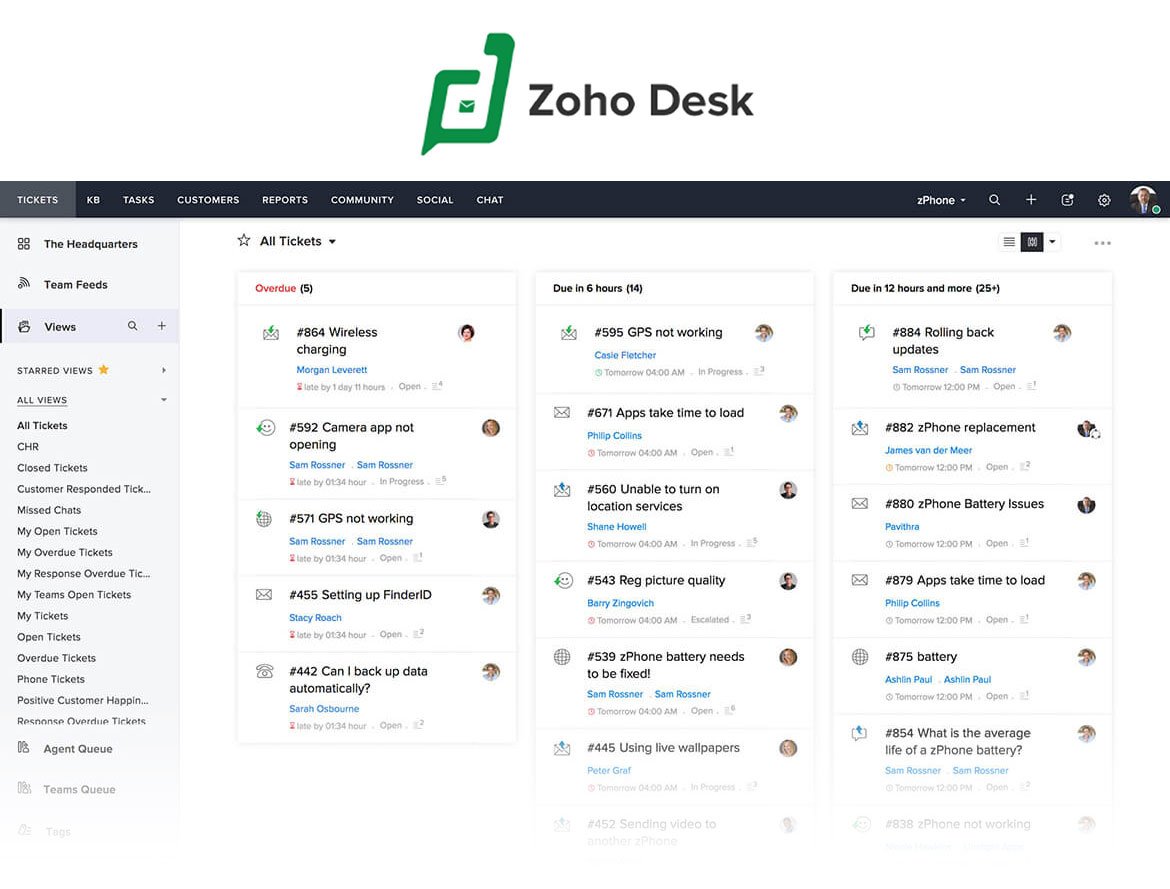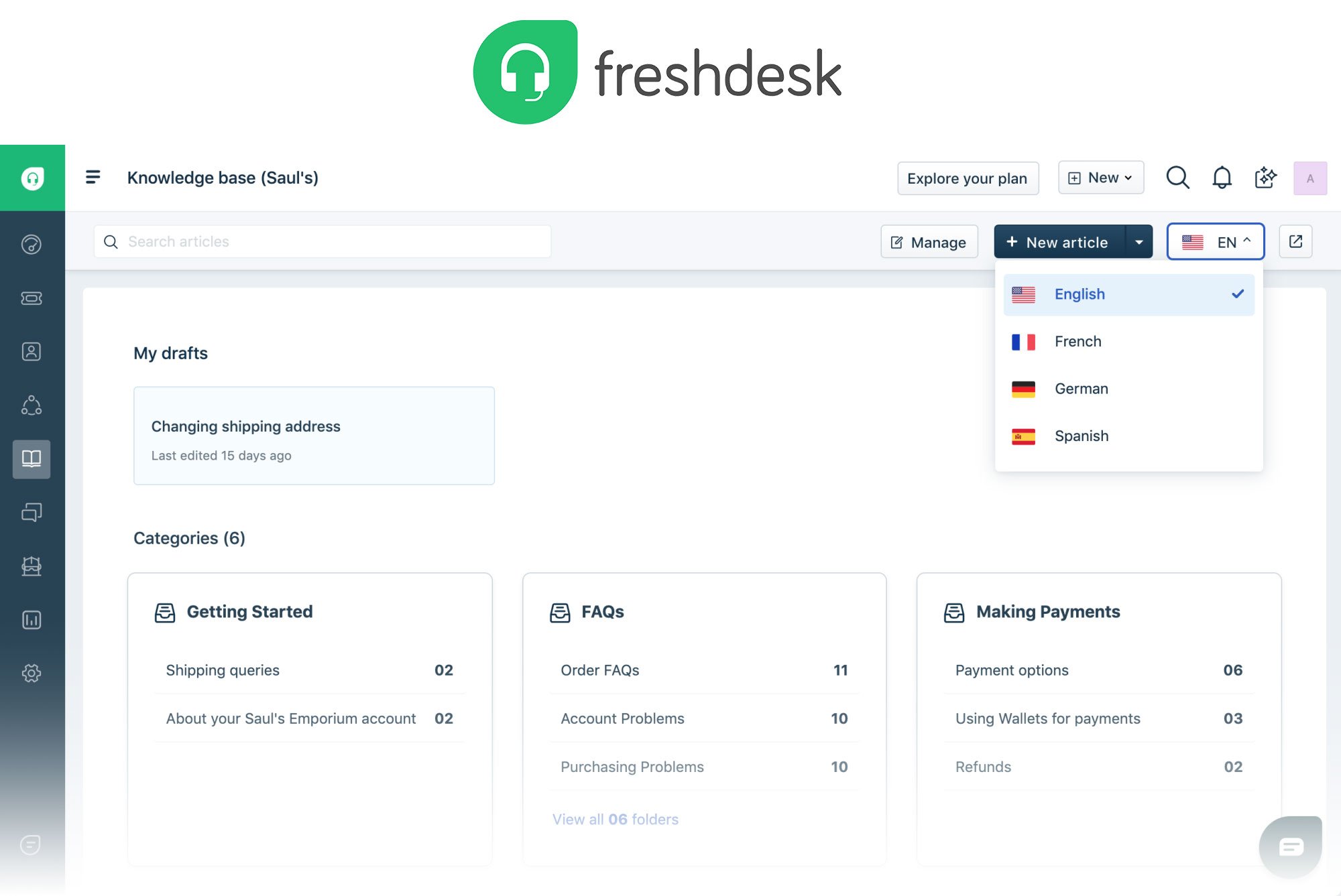If you're considering acquiring free help desk software, you've likely come across options that may seem like a cost-effective and simple way to handle and improve customer support in your organization, without adding extra expenses or making big efforts.
Although it might work for small businesses or startups with limited budgets or for teams who are just starting to implement a formal help desk system, it's important to note that any ticketing system free of charge will likely have constraints. So, you must carefully evaluate the features of each free option before committing to it.
In this article, we’ll break down what defines a free ticketing system, how to choose one that fits your needs, and what to expect from the 10 most popular free service desk ticketing systems.
What is a free ticketing system?
Help desk software is a tool designed to streamline and automate the process of managing customer support inquiries and issues. Its main goal is to minimize response times and improve customer satisfaction by providing a centralized platform for agents to track, prioritize, and resolve all incoming support requests.
As the name suggests, free help desk ticketing software is a version offered at no cost.
It's essential to know and distinguish that free ticketing systems come in various models:
- Open source solutions that provide full source code access but require technical expertise to maintain.
- Ad-supported platforms that display advertisements to offset operational costs.
- Freemium models offering basic features for free, with premium upgrades available.
- Limited free plans that restrict functionality (such as maximum number of agents, tickets per month, or storage capacity).
- Community editions of enterprise software with reduced feature sets.
Why choose a free or open-source ticketing system?
Free and open-source ticketing systems can make sense in specific scenarios:
- Budget constraints: When initial software costs are a significant barrier for small startups or non-profits
- Technical expertise available: Your team has developers who can customize and maintain the system
- Simple requirements: Basic ticket tracking is sufficient for your current needs
- Learning and experimentation: Testing service desk concepts before committing to enterprise solutions
- Open-source philosophy: Your organization prioritizes open-source tools for transparency and community support
5 Must-Have Features in Free Service Desk Systems
Any free ticketing system worth considering should provide these essential capabilities:
- Multi-channel ticket creation - Users should be able to create tickets via email, web portal, or API integration
- Basic workflow automation - Automatic ticket assignment, status updates, and notification triggers
- User permission management - Role-based access controls to separate agents, administrators, and end users
- Reporting and analytics - Basic metrics on ticket volume, resolution times, and agent performance
- Knowledge base integration - Self-service options to reduce ticket volume and empower users
10 best free help desk software for 2026
As we mentioned, there’s no single model for free help desk tools, so we’ve included a mix. Some of these are open-source and self-hosted, offering more control at the cost of added setup. Others are cloud-based with free plans — usually limited by user count, features, or ads.
The goal here is to give you a clear picture of what’s available, how each free ticketing software works, and what you might need to compromise depending on the option you choose.
| Tool | Free model | Agent limit | Best fot |
| osTicket | Open source (Self-hosted) | Unlimited |
Organizations wanting a completely self-hosted, customizable open-source solution |
| Spiceworks | Ad-supported | 5 agents (Core plan) | IT departments managing both help desk and network inventory in one platform |
| GLPI |
Open source (Self-hosted) Paid plugins/hosting |
Unlimited | IT Asset Management integration with inventory tracking capabilities |
| HelpDeskZ | Open source (Self-hosted) | Unlimited | Small teams needing a simple, lightweight ticketing system with minimal setup |
| UVDesk | Open source (Self-hosted) Freemium cloud |
Unlimited (Self-hosted) Limited (Cloud) |
Businesses requiring multi-channel support with e-commerce integration |
| Zammad |
Open source (Self-hosted)
Paid cloud |
Unlimited (Self-hosted) | Teams prioritizing modern UI/UX with social media and chat integrations |
| Hiver | Limited free plan (Cloud) | 3 agents | Gmail-based teams wanting to manage tickets directly from their inbox |
| Zoho Desk | Limited free plan (Cloud) | 3 agents | Businesses already using Zoho ecosystem products seeking integration |
| Freshdesk | Limited free plan (Cloud) | 2 agents | Growing companies needing scalable freemium features with upgrade potential |
| HubSpot service hub | Freemium (Cloud) | 5 agents | Sales-driven organizations integrating customer service with CRM data |
1- osTicket: Best for organizations wanting a completely self-hosted, customizable open-source solution

osTicket is a widely used open-source ticketing system, maintained by Enhancesoft. It’s known for its simplicity and flexibility, especially in self-hosted environments. Organizations looking for full control over deployment often use it on-premise, but a cloud-hosted version is available for a fee.
The platform supports basic integrations through plugins and REST APIs, but remains focused on ticket management rather than full ITSM coverage.
Free model: Open source (self-hosted version)
osTicket features
- Email-to-ticket conversion.
- Customizable ticket fields and forms.
- Auto-responder and ticket filters.
- SLA management.
osTicket limitations
There's no built-in Asset Management or Change Management module, and reporting is relatively basic without third-party plugins. The interface is functional but hasn't evolved much in terms of usability or design.
- Limited reporting capabilities.
- Paid plans (via osTicket Cloud or support packages) offer additional features like hosted setup and customer support.
These limitations aren't addressed in the free self-hosted version. The paid Hosted version offers automatic updates and support, but feature parity remains similar.
osTicket user reviews and ratings
Users appreciate the level of control and customization. However, some mention the interface feels outdated.
- Rating in G2: 4.4
- Rating in Gartner Peer Insights: Not listed
“The best thing about osTicket is the ease of integration through different medium and the ticket tracking. Also the canned response is one of the productive feature. It is a little difficult to find any particular ticket if you don't know the ticket number and also the UI is little bit old times type which gives retro software feel.” - User review from G2
2- Spiceworks: Best for IT departments managing both help desk and network inventory in one platform

Spiceworks is a free online ticketing system supported by ads (up to five admins). It first became known for its free, self-hosted help desk, but that version was discontinued in early 2024.
Today, it offers only the cloud-based Spiceworks Help Desk, which includes core features like ticket assignment, SLA tracking, and basic reporting. As mentioned, the cloud version is available as a free plan for up to five admins or a Premium plan at $6 per seat/month.
Free model: Ad-supported.
Spiceworks features
- Ticketing via email and user portal.
- Knowledge base.
- Mobile apps for ticket management.
- Basic reporting tools.
Spiceworks limitations
- The interface can feel outdated.
- Ads may be distracting.
- Only five seats are free.
Spiceworks user reviews and ratings
Praised for being free with solid core features. Some mention scalability issues.
- Rating in G2: 4.3
- Rating in Gartner Peer Insights: 3.9
“100% free! Very easy to setup; users can easily put in requests; host on our own server; runs smoothly and requires little maintenance once it is setup. Lots of add-ons available to make it more custom. Ads are a bit annoying, but the user interface could be more customizable. Everything else works great.” - User review from G2
3- GLPI: Best for IT Asset Management integration with inventory tracking capabilities

GLPI (Gestionnaire Libre de Parc Informatique) is a French open-source IT Asset and Service Management tool developed by the INDEPNET association and now maintained by Teclib’. It’s highly customizable and often used for ITIL-aligned service desks.
Its open-source model allows full access to the source code and the ability to self-host, which makes it appealing for organizations with strict data control requirements or those wanting to customize their ITSM environment.
However, its security practices came under scrutiny in 2025 due to CVE-2025-24799, a serious vulnerability that allows unauthenticated users to perform SQL injection attacks via the inventory endpoint. Exploiting this flaw could lead to remote code execution (RCE), making timely patching critical for users managing their own installations.
Free model: Open source (self-hosted), with paid plugins and hosted options available.
GLPI features
- IT Asset Management integration.
- Service catalog and Change Management.
- Customizable forms and workflows.
- LDAP and SSO support.
GLPI limitations
The interface can feel outdated, especially compared to more modern SaaS tools. While highly configurable, many features require manual setup or familiarity with PHP and SQL. The plugin ecosystem adds flexibility, but it also increases the maintenance load, particularly for self-hosted environments.
- Setup requires technical expertise.
- Interface learning curve.
- Professional support and hosted cloud versions are available through Teclib.
Security updates must be applied manually unless you're using the cloud version. The 2025 SQL injection vulnerability highlighted the risks of managing GLPI without an active update routine.
GLPI user reviews and ratings
Strong reviews for depth of features and ITAM integration. Usability is a common concern.
- Rating in G2: 4.5
- Rating in Gartner Peer Insights: 4.9
"GLPI network is a great opensource tool, available with full functionalities also in community edition, that cover the ITSM needs as well as the CMDB functionalities. Easy to install and mantain, available in tons of different languages, integrated with a lot of external services and with API well described. Nowadays it is lacking of a string workflow management tool and SLAs can be improved." - User review from Gartner
4- HelpDeskZ: Best for small teams needing a simple, lightweight ticketing system with minimal setup

HelpDeskZ is a lightweight, PHP-based support ticket system that’s simple to install and manage. It’s often used by small teams that need basic ticket tracking without extra features. It enables organizations to manage customer inquiries through a web-based ticketing system.
Free model: Open source
HelpDeskZ features
- Ticket management via email and web form.
- Simple knowledge base.
- Multilingual support.
- Custom fields.
HelpDeskZ limitations
- Limited integrations and automation.
- No cloud-hosted option.
- Entirely community-driven with no formal paid support or hosted service.
HelpDeskZ user reviews and ratings
Harder to find on mainstream review platforms. Users in forums mention it’s functional for small setups but lacks scalability.
- Rating in G2: 4.1
- Rating in Gartner Peer Insights: Not listed
“It is a easy to use software that helps in establishing the relationship between customer and organization. Report system is complicated to understand.” -User review from G2
5- UVDesk: Best for businesses requiring multi-channel support with e-commerce integration

UVDesk is an open-source help desk built with Symfony and PHP, designed for eCommerce support. It includes support for various marketplace and CMS integrations.
Free model: Open source (self-hosted version), freemium for cloud version.
UVDesk features
- Multi-channel ticketing.
- eCommerce integrations (Magento, Prestashop, etc.).
- Email piping and autoresponders.
- Workflow automation.
UVDesk limitations
- Advanced features require setup or purchase.
- UI can be slow with large data sets.
- While it integrates well with e-commerce platforms, other integrations are limited.
- The cloud version offers paid plans with more integrations and support.
UVDesk user reviews and ratings
Users appreciate the focus on eCommerce and modularity. Interface responsiveness is a noted drawback.
- Rating in G2: 4.3
- Rating in Gartner Peer Insights: Not listed
“UVdesk provides all the tools and apps to cover all aspects of Helpdesk software, including workflows, Form Builders, Knowledge Bases, Reporting, Agent Management, and many other components that are essential when serving customers. Its knowledge base UI needs improvements in it's look and feel.” - User review from G2

6- Zammad: Best for teams prioritizing modern UI/UX with social media and chat integrations

Zammad is an open-source help desk and support system developed in Germany. Known for its modern interface and support for chat, email, and social media in one place.
Free model: Open source (self-hosted); paid for cloud and enterprise features
Zammad features
- Omnichannel support (chat, email, Twitter, etc.).
- ElasticSearch-powered search.
- Role-based permissions.
- API and integration capabilities.
Zammad limitations
- Setup and maintenance can be demanding.
- The cloud version is not free.
- Paid options include managed hosting and SLA-based support.
Zammad user reviews and ratings
Users highlight its interface and flexibility. Some users find scaling and admin tasks complex.
- Rating in G2: 4.5
- Rating in Gartner Peer Insights: Not listed
“Being an open-source product, Zammad is free for you to host yourself. It also includes SSO out-of-the-box and other helpful features. It allows multiple agents, tagging, and for ticket catagorisation. Some things you'd think ought to be standard are either not implemented or not implemented well or a bit clunky. Really, it's more a system for tracking your currently open tickets but without a lot of richness in managing performance or reviewing history, finding root causes, identifying trends, etc.” - User review from G2
7- Hiver: Best for Gmail-based teams wanting to manage tickets directly from their inbox

Hiver is a Gmail-based help desk solution. It is particularly beneficial for organizations already using Google Workspace, as it minimizes the learning curve and streamlines workflows.
Free model: Limited free plan for up to 3 users
Hiver features
- Shared inboxes within Gmail.
- Email delegation and collision detection (Assign emails to specific team members and prevent multiple agents from responding to the same query simultaneously.)
- SLA tracking and analytics.
- Internal notes and tags: Add context to conversations with private notes and organize emails using tags.
Hiver limitations
- Only works within Gmail.
- Limited automation in the free tier.
- Upgraded plans offer advanced features like round-robin assignment and integrations.
Hiver user reviews and ratings
Users highlight how easy it is to adopt within Gmail. Limitations in automation are a common critique.
- Rating in G2: 4.6
- Rating in Gartner Peer Insights: 4.7
“Easy to reference an email to internal team members. Since it is an extension, it is easy to add to your workflow. There are some features that are only available for a higher subscription, those should be basic.“ - User review from G2

8- Zoho Desk: Best for businesses already using Zoho ecosystem products

Zoho Desk is part of the Zoho suite, offering a modern help desk with automation and multichannel support. The free plan supports up to 3 agents, making it useful for small teams.
Free model: Forever-free limited plan
Zoho Desk free version features
- Email ticketing.
- Workflow automation.
- Context-aware help desk views.
- Integration with other Zoho apps.
Zoho Desk limitations
- Limited customization in the free plan.
- SLA and advanced reports require a paid plan.
- Paid plans unlock AI tools and additional support options.
Zoho Desk user reviews and ratings
Users like the UI and integration with Zoho’s ecosystem. Some note limitations on flexibility.
- Rating in G2: 4.4
- Rating in Gartner Peer Insights: 4.5
“Part of the broader Zoho ecosystem, which can be beneficial if you use other Zoho products. Basic ticketing functionality works well for simple support needs. Free version is severely limited in functionality, making it practically unusable for most business needs. Missing essential features that are standard in competitor products, such as private agent notes. The upgrade path from free to paid versions can be costly for small businesses.”
- User review from G2
9- Freshdesk (free plan, formerly Sprout) - Best for growing companies, freemium features with upgrade potential

Freshdesk’s free tier began as Sprout, offering a “forever‑free” plan with up to three agents and a rich set of features — including split tickets, SLA reminders, custom ticket views, custom fields, and more.
In 2017, Freshdesk overhauled the Sprout plan for all new accounts. The redesigned free plan allowed unlimited agents, but removed nearly all advanced features present in the “old Sprout". Starting November 2024, Freshdesk cut the free plan’s agent limit from 10 to 2 agents for all users, which affected both legacy and newer accounts. Users who had more than two agents were prompted either to downgrade or upgrade to a paid plan.
Free model: Forever-free limited plan (2-agent limit).
Freshdesk free version features
- Ticketing via email and web.
- Team collaboration features.
- Knowledge base.
- SLA management.
Freshdesk free version limitations
- Automation and advanced reports are locked behind paid plans.
- Limited integrations in the free tier.
- Paid plans offer AI features, more channels, and priority support.
Freshdesk user reviews and ratings
Users appreciate ease of use and fast setup. Some point out that free tier gets limited quickly.
- Rating in G2: 4.4
- Rating in Gartner Peer Insights: 4.2
“The most important thing I like about Freshdesk is that you can use the product for free and when you want more features you will have to pay but the features provided is enough to support customer related features. I don't like the mobile version. Notification is very slow on the Mobile application." -User review from G2
10- HubSpot service hub: Best for sales-driven organizations integrating customer service with CRM data

HubSpot Service Hub is part of HubSpot’s broader customer platform, known for its CRM, marketing, and sales tools. It’s a cloud-based help desk solution aimed primarily at small to mid-sized businesses that want customer service tightly integrated with sales and marketing.
The free plan includes access for up to 5 users, which makes it viable for small support teams. It follows a freemium model — offering basic features for free, while advanced functionalities (like automation, SLAs, and custom reporting) require an upgrade.
Free model: Freemium - free plan for up to 5 agents
HubSpot service hub free version features
- Shared inbox.
- Assign and track tickets with basic workflow capabilities.
- Includes a customizable chat widget that connects directly with the CRM.
- Comes with full access to HubSpot’s CRM, so customer context is available on every ticket.
HubSpot service hub free version limitations
Support for the free plan is mostly limited to the HubSpot Community and documentation; paid tiers include direct support.
- No automation, SLAs, or reporting dashboards.
- Doesn’t include a knowledge base, which can be limiting for self-service strategies.
- Paid plans lift these restrictions and provide access to full omnichannel capabilities.
These limitations are lifted in paid plans, which also unlock more channels and allow for better team scaling.
HubSpot service hub user reviews and ratings
Users generally highlight how easy it is to use, especially for teams already working in HubSpot. The integration with the CRM and marketing tools is frequently mentioned as a plus. Some reviewers point out that the limitations in the free plan become more noticeable as ticket volume increases or the team grows.
- Rating in G2: 4.4
- Rating in Gartner Peer Insights: 4.6
“We transitioned from free HubSpot seats to service hub to gain access to the knowledge hub feature. With it, we are able to provide high-quality standardized responses to our frequently asked questions. My complaint is with understanding which Hubspot features were tied to which product and how they overlapped. We still aren't sure if there is a better combination of hubs we could use to achieve everything we are trying to do through Hubspot.” - User review from G2
How to choose a free ticketing system for your organization
There’s no shortage of help desk software on the market, but not every organization is ready — or willing — to commit to a paid tool right away. That’s where free ticketing systems come in. Small IT teams, nonprofits, startups, or businesses testing the waters of ITSM can benefit from these tools without having to budget for new software.
Still, any ticketing system free plan comes with trade-offs. Before settling on a system, it’s worth considering how well the tool fits your environment and how long you plan to rely on it. Here are a few things to look at during your selection process:
- Core functionality: Does it support basic ticket workflows like categorization, prioritization, and internal notes?
- Ease of use: Can your team start using it with minimal training?
- Deployment type: Are you comfortable hosting the software yourself, or do you prefer a cloud-based solution?
- Support availability: Is documentation or community help available if something breaks?
- Scalability: Can it handle more users or tickets if your needs grow?
Some tools offer enough for small teams to operate without issue. But as your processes mature or your volume increases, you’ll likely need more than a stripped-down system can offer.
Is a free option not enough? Try InvGate Service Management
Sticking with free help desk software indefinitely is tempting, but that only works if the tool keeps pace with your needs. In many cases, a free tool can lead to workarounds, duplicated effort, or limited visibility once the volume scales. That’s why it’s worth considering a full-featured help desk platform.
InvGate Service Management delivers everything you'd expect from leading ticketing platforms, plus powerful additional capabilities:
- Unlimited ticket volume and user capacity
- Multi-channel ticket creation (email, web portal, chat, phone)
- Intelligent ticket routing and automatic assignment
- Advanced SLA management with real-time tracking
- Customizable workflows and approval processes
Plus, technical support with our experts and regular feature updates and security patches.
Ready to see the difference? InvGate Service Management offers a 30-day trial with no credit card required. You'll get full access to all features, allowing you to experience the platform's complete capabilities without any commitment. Then, you can turn your trial instance into your permanent solution seamlessly.















